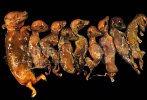Japanese B Encephalitis
Japanese B encephalitis is caused by a virus found in South Asia, it is transmitted by mosquitos and presents as reproductive problems.
Information
Japanese B encephalitis is caused by a virus transmitted by mosquitos. The disease is confined to a large area of southern Asia. It can affect most domestic animals and produces encephalitis in humans. Pigs are a significant source of infection.
Symptoms
Sows
- Mummified fetuses.
- Stillbirths.
Boars
- Infertility.
- Testicular degeneration.
Nursing piglets
- Subcutaneous edema.
- Hydrocephaly.
- Weak piglets.
- Neurological symptoms in piglets - attacks and seizures.
Nursery and fattening
- No clinical signs.
Causes / Contributing Factors
- Presence of mosquitos.
- Susceptible pigs.
- Other species that act as reservoirs of the virus.
Diagnosis
- Lab tests of stillbirths and of testes from affected boars.
- Definitive diagnosis requires tissue culture virus isolation, and serum antibodies from stillbirths, usually using ELISA.
- Differentiate from other similar reproductive problems as those caused by parvovirus, Aujeszky's disease, porcine reproductive and respiratory syndrome, some strains of influenza, classical swine fever and some enteroviruses.
Control/Prevention
- There is no effective treatment.
- Vaccination.


